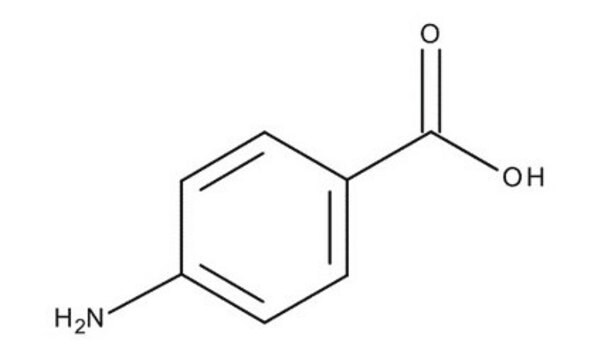8.21762
2,5-Di-tert-butylhydroquinone
for synthesis
Synonym(s):
2,5-Di-tert-butylhydroquinone
About This Item
Recommended Products
Quality Level
Assay
≥98.0% (HPLC)
form
powder
autoignition temp.
420 °C
mp
212-218 °C
storage temp.
2-30°C
SMILES string
Oc1c(cc(c(c1)C(C)(C)C)O)C(C)(C)C
InChI
1S/C14H22O2/c1-13(2,3)9-7-12(16)10(8-11(9)15)14(4,5)6/h7-8,15-16H,1-6H3
InChI key
JZODKRWQWUWGCD-UHFFFAOYSA-N
Application
- Food Contact Material Study: Investigated the occurrence and application areas of 2,5-di-tert-butylhydroquinone in food contact materials, highlighting its use and safety implications (Pedersen & Cederberg, 2014).
- Antibacterial and Anti-Biofilm Properties: Explored the potential use of DBHQ as an antibacterial and anti-biofilm agent against Staphylococcus aureus, suggesting new applications in medical and healthcare fields (Kim et al., 2022).
- Cognitive Performance and Metabolomics: Investigated serum and CSF metabolites, including DBHQ, in stroke-free patients, offering insights into vascular risk factors and cognitive performance, relevant for neurological drug development (Peng et al., 2020).
- Cellular Mechanism Study: Assessed the role of DBHQ in Ca2+ handling in cellular models, which could be critical for understanding cellular mechanisms in drug discovery and development (Liu et al., 2015).
- Review on Food Additives: A narrative review highlighting the excessive use of DBHQ in food products and its potential health impacts, emphasizing the need for accurate monitoring and regulatory review (Khezerlou et al., 2022).
Analysis Note
Melting range (lower value): ≥ 212 °C
Melting range (upper value): ≤ 218 °C
Identity (IR): passes test
Signal Word
Danger
Hazard Statements
Precautionary Statements
Hazard Classifications
Acute Tox. 3 Oral - Aquatic Acute 1 - Aquatic Chronic 1 - Skin Sens. 1 - STOT SE 3
Target Organs
Respiratory system
Storage Class Code
6.1C - Combustible, acute toxic Cat.3 / toxic compounds or compounds which causing chronic effects
WGK
WGK 3
Flash Point(F)
Not applicable
Flash Point(C)
Not applicable
Certificates of Analysis (COA)
Search for Certificates of Analysis (COA) by entering the products Lot/Batch Number. Lot and Batch Numbers can be found on a product’s label following the words ‘Lot’ or ‘Batch’.
Already Own This Product?
Find documentation for the products that you have recently purchased in the Document Library.
Our team of scientists has experience in all areas of research including Life Science, Material Science, Chemical Synthesis, Chromatography, Analytical and many others.
Contact Technical Service









